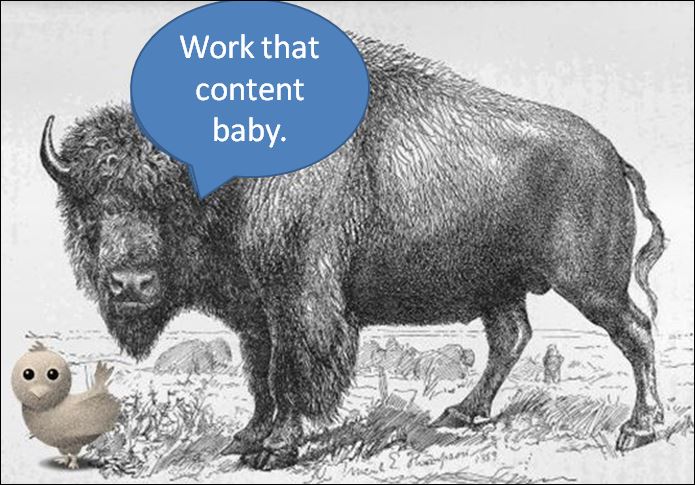I’ve worked with a number of large and small companies to help them develop a culture of content creation and there seems to be a few common themes that enable success. Here are some steps that launch a company toward a vibrant culture of content creation:
1. Use the whole buffalo
The first question many companies ask is, “Where is all of this content going to come from?” They don’t realize they may already be sitting on a wealth of resources.
When native American Indians killed a buffalo for food they wasted nothing, using every part of the animal to make clothes, shelter, and weapons. Likewise, we should inventory all of our company content assets and leverage them to the max so that these existing investments are not wasted. Regular sources of superb content may already be coming to you through the form of:
- speeches
- customer presentations
- visits from guests and customers (why not do a video/)
- customer service bulletins
- investor communications
- marketing materials
- PR efforts
- employee newsletters
Try to extract as much value from the content you have by tailoring it to the social web and igniting it across multiple channels. Use your whole buffalo!
2. Start with passionate volunteers
Starting an initiative to create original content can come as a shock to an organization. One idea for success is to start where you are going to have the best chance for success — passionate volunteers.
My friend Jay Baer once said that “if you don’t love social media you will suck at social media” … so find the people who already love it. In my mind this may be more important than finding people with writing ability or even marketing experience. Go to where the passion resides.
One company I work with started with five passionate volunteer bloggers and it grew to more than 200 in two years — organically! The enthusiasm spread from the passionate core.
3. Hire short-term help
It’s not fair to “pile on” new content management duties when your people already have full-time jobs. When just starting out, think about hiring an outside editor to help you get going. The duties would include:
- Assisting with the content plan and keeping it on track
- Assuring that content goes through the proper internal reviews
- Editing volunteer content and making sure the content is appropriate and relevant
- Coaching company bloggers to help them improve
- Assure that blog comments and questions are being addressed
As your initiative grows, you will reach critical mass where you can consider hiring a full-time internal community manager to handle these tasks. Bring in an experienced resource to help give you your best chance for success.
4. Build-in quick wins
You need to “market your marketing” internally as well as externally. Reward bloggers and highlight their successes. One company maintains a leader board of bloggers who reach certain milestones and then rewards the top contributors with special events and company merchandise.
Build the opportunity for quick wins into your content marketing plan and promote with your internal leaders. Showing off the fun and success of your content team will get others interested in participating. Make it exciting. Build momentum.
5. Bring in some Top Guns
In addition to employee-created content, many companies also feature content from outside industry experts. Typically this is a paid assignment, but some authors are happy to do it for the exposure. This has a couple of strategic advantages:
- Adds instant credibility to your content marketing effort
- Provides third party validation to your company and brand
- Attracts fans of the author to your blog and to your company
- Can jump-start subscriptions and engagement
- Establishes a baseline of high quality “evergreen” content
So there you have it — Five ideas to help establish a “content culture.” What ideas would you add? How do you transform a company into a content-creating machine?
 Mark Schaefer is the chief blogger for this site, executive director of Schaefer Marketing Solutions, and the author of several best-selling digital marketing books. He is an acclaimed keynote speaker, college educator, and business consultant. The Marketing Companion podcast is among the top business podcasts in the world. Contact Mark to have him speak to your company event or conference soon.
Mark Schaefer is the chief blogger for this site, executive director of Schaefer Marketing Solutions, and the author of several best-selling digital marketing books. He is an acclaimed keynote speaker, college educator, and business consultant. The Marketing Companion podcast is among the top business podcasts in the world. Contact Mark to have him speak to your company event or conference soon.



